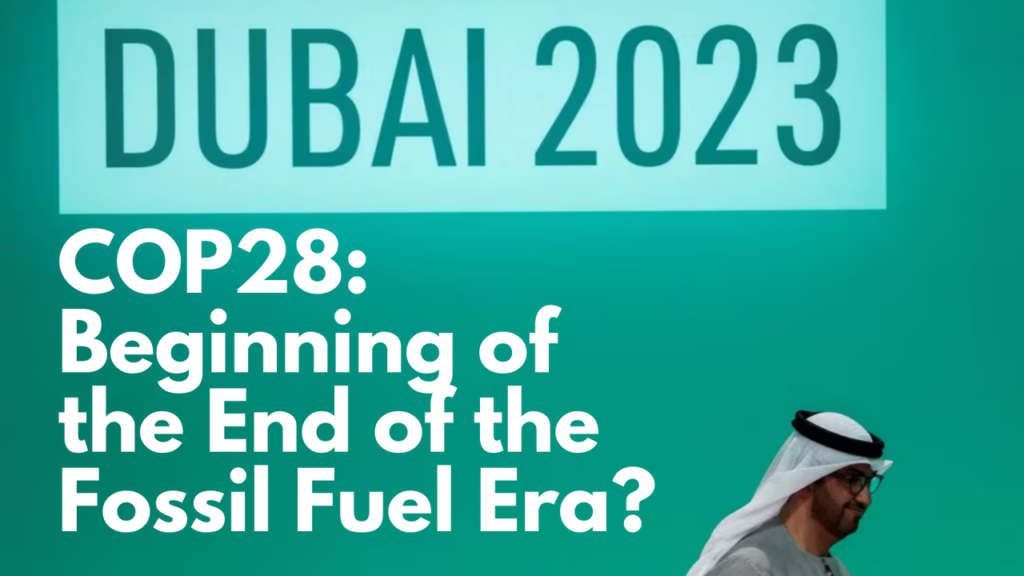Tim Mohin – COP28: Beginning of the End of the Fossil Fuel Era?

|
Listen to this story:
|
This COP was different. Because it was hosted by a “petro-state” there was both hope and fear that it could make the breakthrough the world needs to fight climate change. But, as the clock clicked down, a deal looked out of reach. The negotiators worked into the wee hours, and emerged victorious with an agreement that was greeted by cheers and applause by delegates.
Many have voiced concerns that the agreement lacked specifics or enforceable mechanisms. While it fell short in some aspects, it also broke new ground.
The all-important sentence in the over 11,000 word final ‘global stocktake’ agreement read “Transitioning away from fossil fuel in energy systems, in a just, orderly and equitable manner, accelerating action in this critical decade, to achieve net zero by 2050 in keeping with the science.” These 34 words could mark a turning point for climate action, as it is the first time a COP agreement has decreed transitioning away from fossil fuel.
The text also recognizes the further adoption of transition fuels, like natural gas, and the use of carbon capture and storage as key parts of the picture, and requires countries to submit stronger carbon-cutting plans by 2025 at COP30 in Brazil.
According to some delegates, it was the COP president Sultan Al-Jaber who got the deal over the line. “The much-criticized U.A.E. Presidency has pulled this off,” Myles Allen, a climate scientist, said, “everyone seemed ready to write COP28 off just 24 hours ago, you have to hand it to them.”
In his piece about the agreement Bill McKibben, said that this “transitioning away from fossil fuel” sentence may seem inconsequential to some. But along with a sentence about agreeing to humans being responsible for the changing climate at COP1 and an agreement to limit warming to at least 2°C in COP21’s Paris Agreement, it could be one of the three most important sentences in COP history and will be an effective tool for activists.
However, as John Kerry said, countries will be judged on how they meet these pledges. The US climate envoy who celebrated his 80th birthday at the event said “Try coming to the next COP and having not done anything. Try putting out a revision of your long-term strategy and not actually facing up to your challenges.”
In his closing remarks UN Climate Change Executive Secretary Simon Stiell said, “Whilst we didn’t turn the page on the fossil fuel era in Dubai, this outcome is the beginning of the end.”
After attending a few of these events, this one was different in an important way. COP28 was more like a trade show than an environmental summit. With more than 100,000 attendees, including representatives from all industrial sectors and civil society, the agreements forged on the sides of the main negotiations are taking on a life of their own and are, arguably, as valuable in the fight against climate change.
Now we look ahead to Azerbaijan, the new COP29 host, where the focus will be additional climate financing.
An Imperfect Deal

While the final text from COP28 was hailed as a huge step by some, not everyone was happy with the wording. The Alliance of Small Island States (AOSIS) claimed that the final pact contained a “Litany of loopholes.” The group of 39 small island nations (who also signed the agreement) said they were not in the room when the deal was gavelled through. Anne Rasmussen, the lead negotiator for AOSIS, said “We are a little confused about what just happened… It seems that you gavelled the decisions, and the small island developing states were not in the room.”
The agreement was summed up in this quote from Inger Andersen, of the United Nations Environment Programme, “The deal is not perfect, but one thing is clear: the world is no longer denying our harmful addiction to fossil fuels.” Or to quote the American statesman Henry Clay “A good compromise is when both parties are dissatisfied, and I think that’s what we have here.”
More Work Needed to Limit Warming to 1.5°C

As shown by the above Climate Tracker infographic and by an International Energy Agency (IEA) analysis, the agreements achieved at COP28 will not be enough to limit warming to 1.5°C.
The IEA said, “They would not be nearly enough to move the world onto a path to reaching international climate targets,” they would only go 30% of the way toward bridging the emissions reduction gap needed to keep 1.5°C alive.
Johan Rockström, of the Potsdam Institute for Climate Impact Research, said the COP28 agreement was a “pivotal landmark” but “will not enable the world to hold the 1.5°C limit.”
This Smart Read article is contributed by Tim Mohin, Global Sustainability Leader, BCG. Every week ESG News delivers smart commentary from ESG practitioners and experts to unpack issues of the week. Submit your ESG Smart Read to [email protected]










